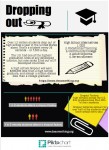“Will you buy a walking stick? They are only 30 quetzals,” the shabbily dressed little girl said in Spanish to my father. She carried a variety of sticks painted in exotic colors to match her poorly put together dress.
My father bought a walking stick and we went on our way up the steep Pacaya volcano in Guatemala. I asked my father why would he buy the walking stick? We certainly didn’t need one. “Find the answer yourself,” he simply said.
I didn’t find the answer that day, or week. I found the answer two weeks later while stopped at a red light headed to La Aurora International Airport.
A poorly dressed man walked up and down the sidewalk shouting out the various fruits he had in the basket on his head. By impulse my father motioned the man over and bought a bundle of Rambutans. He handed the man the amount requested and then the rest of his quetzals. The man gratefully took the money and muttered a quick blessing. I realized I could never be in their place. I could never experience life from their standpoint.
The little girl who would walk up to strangers in hopes of earning some money was braver than me. While I could experience the amusement parks, beaches and malls that Guatemala had to offer, she could not. She would have to wake up early every morning, missing school, to feed her family. Fifty four percent of the population in Guatemala lives below the poverty line. Out of 215 countries, Guatemala ranks 174 in literacy rate. Kids cannot go to school when they are needed to put food on the table. Only 16 percent of the entire population uses the Internet. How would they be able to afford it if over half of the country lives below poverty? I can wake up at any given time and access the laptop on my desk. The majority of the people living in Guatemala wake up at a certain time to harvest the fruit, paint the sticks, bake the food or sell any materialistic object of value to put beans, rice and tortillas on the table.
My father wouldn’t give money to those who begged. He would give money to those who took the time to stand outside and offer the fruits of their labor. We bought beautiful, colorful flowers from Mayans running a stand, and a hand knitted pouch that wasn’t labeled “Made In China” from a young woman. I bought a little slingshot from a street vendor. I bought their handcrafted artworks, but they sold me their experiences.
I’ve lived in the United States my whole life. I will never know the environment 54 percent of Guatemala’s population goes through every day. Most kids at Northwood, or in America, wouldn’t know the environment either. Fifteen percent of the population in the United States lives below the poverty line. However, poverty in a developed nation cannot be compared to poverty in a developing nation. In the United States, welfare programs are available for those in need. In Guatemala, everyone is on their own, which is why they sell any object of value. Their work ethic and dignity far surpass my own. I didn’t realize that until people in poverty showed me.
Every day I carry something from Guatemala to remind myself of my learning experience. I look at it every single day, and it doesn’t fail to remind me of the cramped roads, putrid smells and the struggle people face in a developing nation and the lesson they taught.
— Byron Aguilar

